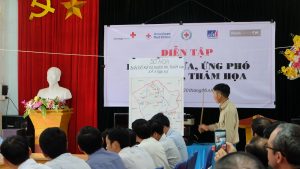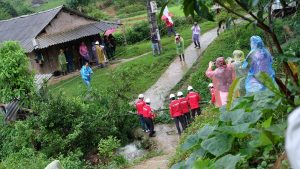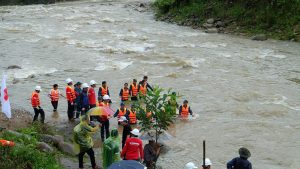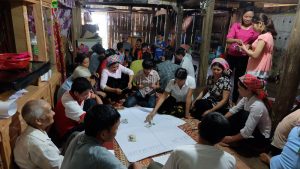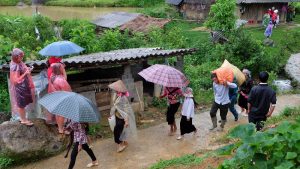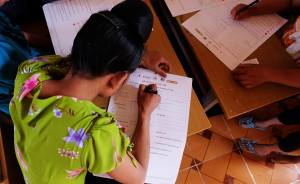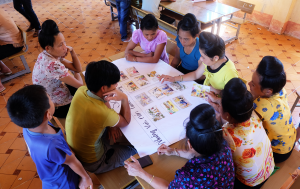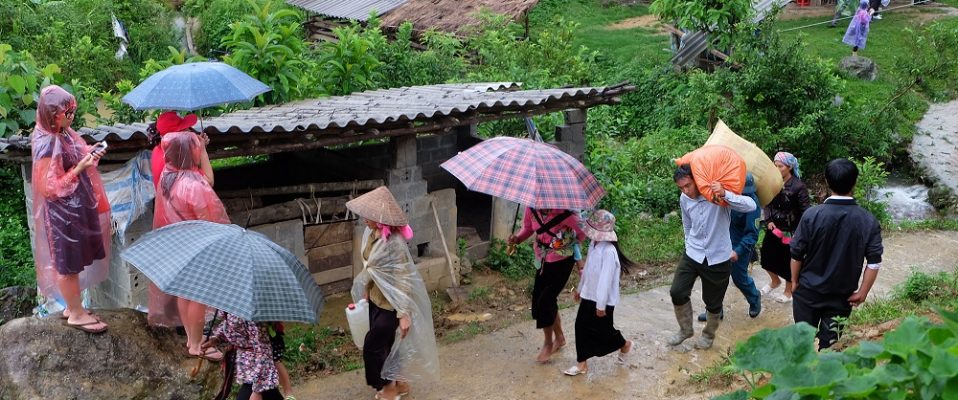
Gender-sensitive community-based disaster risk management project in ethnic minority areas of North-West Vietnam, implemented by the Vietnam Red Cross with support from the French Red Cross through Ready Fund, the American Red Cross and French Development Agency (AFD), from April 2014 to September 2017 in 12 communes and wards of ethnic minorities in Lai Chau and Son La, with the total budget of 1.5 million Euro has come to an end.
Even though the mountainous areas of North-West Vietnam often face several extreme disasters such as landslide, flash flood, cold wave and forest fire, the local authorities and people’s preparedness, response and recovery capacity and knowledge were very limited. Therefore, the Project brings significant values to the community, contributing to the resilience of North-West Vietnamese women, men and youths facing the impacts of natural disasters and increasing capacities of vulnerable ethnic minority communities and local actors to prepare for disasters and reduce risks through a gender-sensitive, participatory and replicable approach.
After 42 months, the Project has obtained many positive results including the following impressive figures:
- 12 Assessments, namely Vulnerable and Capacity Assessments (VCA) and Community-Based Disaster Risk Assessments (CBDRA), have been conducted involving 2,294 officials and people
- 02 Provincial Disaster Response Teams, 12 Community Action for Disaster Response (CADRE) teams with 320 members have been established, trained and equipped
- 55,000 people and 2,063 students have been equipped with disaster preparedness and gender equality knowledge
- 44 mitigation projects at communes and schools have been funded and carried out benefiting over 3,500 people and 5,000 students
- 36 disaster response simulations have been organized participated by 2,245 people and 2,840 students and teachers
- 48 teachers have been trained on disaster preparedness and safe school and 288 teachers have undergone first aid training
- Gender-sensitive frame has been developed and implemented in all Project activities
The Project’s most significant achievements are (1) building a group of capable officials in disaster management from provincial to community levels (2) mitigation constructions contributing to community’s vulnerability reduction, (3) awareness-raising campaign on disaster preparedness with a communication toolkit specifically-designed for the ethnic-minority people of North-West Vietnam and (4) gender issues being considered and integrated in all Project activities.
In the two target provinces, the Project has contributed to building a group of young, dynamic, knowledgeable and experienced officials for disaster management. At provincial level, they are the trainers for Community Based Disaster Risk Assessment (CBDRA), Provincial Disaster Reponses Teams (PDRT), trainers for Community Action for Disaster Response (CADRE), trainers for communicators, and first aid trainers. At commune and community level, they are the Communicators, Assessment Facilitators, Emergency Response Teams, and primary school teachers. These officials will be the core actor to maintain the disaster preparedness activities that the Project has started in the two provinces. They will also be a vital actor in the national Red Cross Society’s disaster preparedness and response work.
The mitigation constructions supported by the Project were carried out based on the needs of local people. They were proposed, implemented, contributed to in terms of capital and labour contribution, monitored, evaluated, managed and maintained by the local authorities. These constructions such as bridge, embankment, ditch, water network, shelter, disaster-warming system namely the loudspeakers, etc., do not only enhance the community’s disaster preparedness capacity but also bring significant improvement to people’s life. At schools, using the same participatory approach, the Project has provided supports for mitigations such as embankment construction, roof solidification, handrail solidification, repairing of electrical system, yard concreting, lavatory construction, repairing of water network, etc., improving the schools’ disaster response readiness as well as their operation.
Meanwhile, a communication campaign on disaster preparedness for rural people at the mountainous North-West areas was carried out to equip the locals with knowledge and skills to pro-actively protect their assets, their lives and their loved ones in the occurrence of disaster. Using the direct communication channel, the campaign held a training course for dynamic officials who can speak both national and local languages, those who can learn the knowledge and communicate them to local people. Afterward, these facilitators used the communication toolkit specifically-designed for people of ethnic minorities at Project communes and organized communication sessions at villages. The awareness-raising toolkit used symbol and illustrations, enabling even illiterate people to understand the ways to prepare for, respond to and recover from disaster. Moreover, the toolkit was designed to encourage people’s participation through group activities and games. This enhanced the session’s effectiveness, and made the knowledge more interesting, easier to understand and stay longer in people’s memory.
Throughout the project development, implementation and monitoring process, gender integration was an important and constant element of all project activities. In particular, the Project has carried out the following activities: conducting gender analysis at the beginning of the Project to assess the roles, capacities and needs of men and women at project areas, developing Gender Integration frame to include gender issues in all project activities, developing gender awareness-raising and/or gender-sensitive tools, carrying out diverse and dynamic gender and diversity awareness-raising campaigns such as direct communications, photo contest, photo-telling story contest, discussions, contests and so on. The Project also contributed to the revision of Vietnam Red Cross’s Disaster management standards documents towards Gender and Diversity inclusion. These documents include guidance for Community Based Disaster Risk Assessment and Vulnerability and Capacity Assessment (VCA).
The Head of Delegation of the French Red Cross in Vietnam, Eric Legendre, considered Vietnam Red Cross a vital factor in ensuring the Project’s sustainability. He shared: “This project was a kind of pilot, first phase, project for which we selected and implemented activities in only a few locations among the most vulnerable. There are still plenty of similarly vulnerable and low resilient locations in Vietnam. Implementing activities together with the Vietnam Red Cross, represents probably one of the most important factor to ensure sustainability. Today, the Vietnam Red Cross has the know-how, the human resources and the tools to scale-up and replicate the same activities in the other vulnerable locations in Vietnam. They usually simply miss the funds to implement these activities.”
Project results infographics
Project documentary video
Photo gallery
![]()


